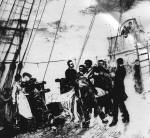On the 25th November, his diary recorded:
"There are great quantities of flying fish constantly about the vessel today.
Sometimes they rise singly from the water and at other times in large flocks,
looking in the distance like flocks of birds --- they look to be about the size
and form of mackerel. We have a fine working breeze S. E. and by E. and are in
hopes we have fallen in with the other trades although still North of the Line."
The diary entry for William Richards is so very different for the same day -
even when he records the death of another "gentleman passenger" there was no
matching note of the event in the diary of James Trangmar.
William's diary for the 25th November was as follows:
 "Caught the S. E. trades. Child died. Mr. Watson, Gentn passenger died leaving a
wife and 3 children bound to Bathurst having purchased Land there prior to
leaving England. When the coffin was thrown overboard, owing to the 5, 181b shot
which ran to the foot, the lid flew open and the coffin, with the Body went off
erect under water but did not sink." [It was this entry, of course, which led
Colin Kerr in his "An Exelent Coliney", to name his chapter "The Floating
Coffin".] William continued with "Ship in sight going west, the first
we have seen since the 10th."
"Caught the S. E. trades. Child died. Mr. Watson, Gentn passenger died leaving a
wife and 3 children bound to Bathurst having purchased Land there prior to
leaving England. When the coffin was thrown overboard, owing to the 5, 181b shot
which ran to the foot, the lid flew open and the coffin, with the Body went off
erect under water but did not sink." [It was this entry, of course, which led
Colin Kerr in his "An Exelent Coliney", to name his chapter "The Floating
Coffin".] William continued with "Ship in sight going west, the first
we have seen since the 10th."
At some stage he added in the left hand margin of his diary, a sad note about
Mr. Watson, which I alluded to in my introduction.
The note reads as follows:
"Mr. Watson was in the habit of spiting blood and nothing but a Milk Diet
prevented it. Previous to his leaving England he paid £250 for his passage with
a written agreement signed by the owners and Captn. that he should be supplied
with a quart of Milk a day. This he had for a week or two, when it was cut off,
that the calf might be reared --- he soon flaged." (Authors note, spelling as
original)
It was William who was to next make an entry in his diary:
"November 26th. Fine and squally. This day, while at dinner a large ship bore on
us. An alarm was given to get letters ready for England. She turned out to be a
Dutchman homeward bound. Several vessels seen ahead. We are all covered with a
rash which prevents fever (?). We are in the best part of the ship having free
air from the cabin windows which are left open day and night. The Captain is
very careful when the squalls come, to avoid them and recover his course again."
would permit. 21° 5' South lat. 32° 41' West long. Isle of Trinidad bearing
N.E. a quarter N. 139 miles.
December 9th. Passed the tropic of Capricorn this morning, steering S.S.E. with
a fine wind all day. 24 of FS. lat. 30° 2' West long.
December 10th. About 5'o'clock this morning saw the spout of a Sperm whale
several
times.
December 11th. Today at 12 we are at 30°
7' South lat. 27° 45 'West long."
William made similar observations about whales in the same period:
13th In the latitude of The Cape but far west. Lost the trades but got a fine
wind to work up the longitude.
14th. Therm. 71°. Rather cold, more pleasant than the tropical heat. Several
whales passed spurting water.
15th. Spoke with Dutch ship from North Batavia very cold 1500 miles to make the
Cape being far West.
17th. S.W. Squally and cold. 18th. East wind ahead.
20th. S.W. Several albatross killed.
21st. E. Ahead, great complaints about the provisions, beef thrown overboard,
pork stinking. Dr Martin very haughty. The supposed ladies in the cuddy
discovered to be bad characters'.